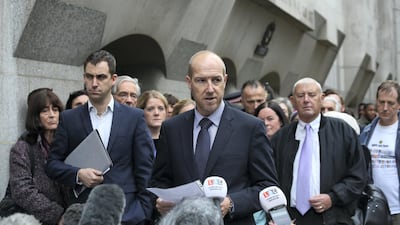A retired detective who led the investigation into the murder of British politician Jo Cox has said there is an unexplained mystery at the heart of the case that needs to be solved.
Ms Cox, a Labour Party member of the UK parliament, was shot and stabbed as she entered her constituency office in Birstall, West Yorkshire five years ago, by neo-Nazi extremist Thomas Mair.
An unanswered question in her murder is how Mair, who appeared to be a social recluse, got hold of the .22 sawn-off rifle that he used to kill her.
The weapon had been stolen 17 miles away in the town of Keighley, and modified in an underground workshop.
Mair owned a mobile phone from which he had sent only three messages in three years. Most of his correspondence was online with US and South African far-right organisations.
Former detective superintendent Nick Wallen, who led the investigation into the murder of Jo Cox, described Mair as an "antisocial loner, in the truest sense of the word".
Mr Wallen told The National the only unsolved aspect of the case was how Mair obtained the gun.
Speaking on the fifth anniversary of Ms Cox's death, Mr Wallen described what happened as a “tragedy” and urged those with information about the missing piece of the puzzle to come forward.
“I cannot underline how important it is for anyone with information about how Mair obtained the firearm to come forward and share that information with the police,” he said.
“That was the one aspect of the investigation that, at the time I left the police, remained unsolved.”
Mr Wallen said acquiring a stolen firearm is not easy, unless a person is a criminal and knows how to get one.
"He was not somebody who was immersed in criminality, making calls, wheeling and dealing, trying to get himself a firearm," he said.
“That begs the question ... ‘How did you, Thomas Mair, get that gun?’"
Officers have made repeated attempts to interview Mair, but despite asking him why he did it and telling him that Jo Cox's family want to know why she's dead, he refuses to answer any questions.
During his trial Mair maintained his silence, only asking to read a statement after his conviction.
The judge refused him permission, out of concerns that he would deliver a political rant.
West Yorkshire Police told The National the force has "exhausted" all lines of enquiry but would re-investigate if new evidence is received.
“A lengthy investigation was carried out to try and establish how Thomas Mair acquired this firearm,” a police official said.
“All lines of enquiry have for the time being been exhausted but the investigation will be revisited if further information comes to light.”
After the murder, the UK security services put the far right under more intense scrutiny.
Right-wing group National Action was banned only months later.
Experts have criticised the police for not taking the far-right threat more seriously previously and believe they are now playing "catch-up".
"The murder of Jo Cox was a turning point and a wake up call for the security services to up their game," chairman of Muslims Against Anti-Semitism, Ghanem Nuseibeh, told The National.
"It clearly was a failure and the time it has taken ... demonstrates how much the police are effectively playing catch-up.
“This is not good enough in a world of rapidly changing tactics by terrorists. Things are changing but they are not changing fast enough.”
Keighley has been a hotbed for the far right, with the British National Party once having its headquarters there.
But Mair's only known connection to the far right in Britain was that he once attended a BNP event in London. No link between him and Keighley was found.
Publisher and former editor of the regional newspaper The Press, Danny Lockwood, who attended Mair's trial, said the far-right motive came as a shock to the community.
“Jo Cox’s murder is still what it was in the hour after her death – unbelievably tragic,” he said.
“The community were stunned. There was no far-right presence.
“The prosecution did their best in court to portray Mair as a white supremacist, with his links to South Africa and the US. They then tried to tie him in the most tenuous way to British groups. No one knows how he got that gun, if it was given to him by a far-right sympathiser.
“Could it have been a far-right conspiracy? It probably could have been but I think, unless Mair confesses, we will never know the truth.”


